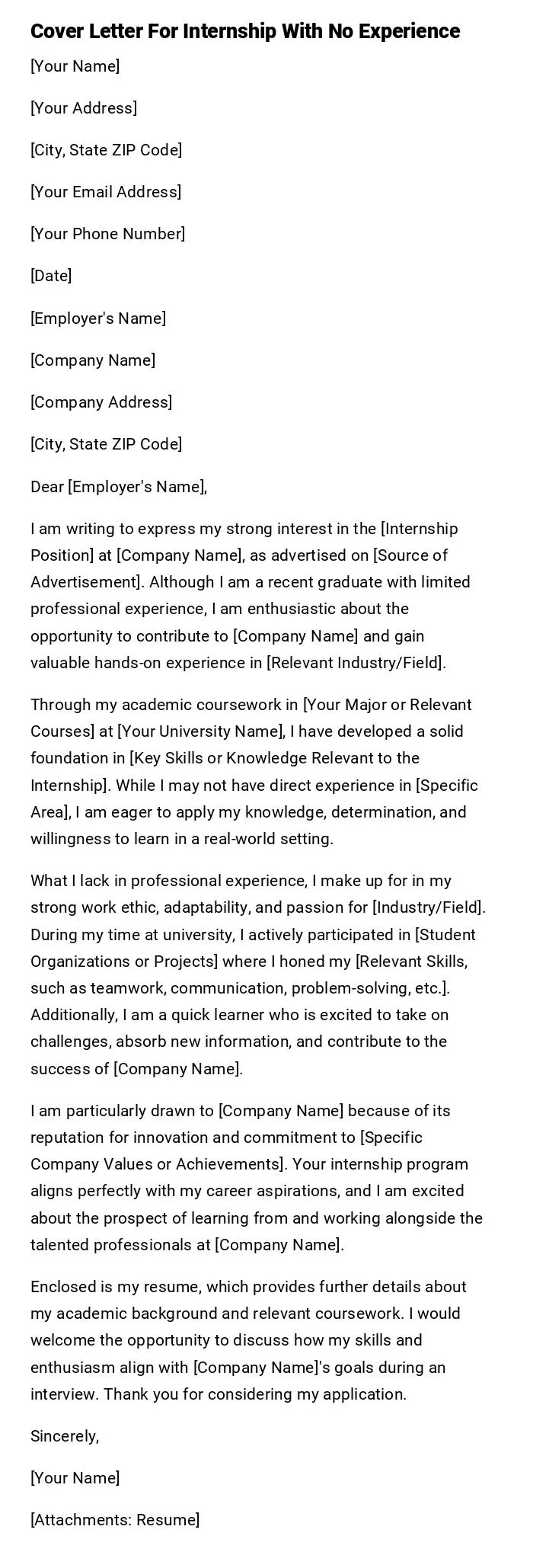Why a Legal Internship Cover Letter Matters
A legal internship cover letter is your first chance to make a strong impression on potential employers. It serves as an introduction to your skills, experiences, and aspirations. Even without prior legal experience, a well-crafted cover letter can highlight your potential and demonstrate your suitability for the role. It is an opportunity to showcase your personality and enthusiasm for the legal field. The cover letter gives you a platform to go beyond the resume and provide context to your qualifications. It is where you explain why you are interested in the specific internship and what you hope to gain from it. A compelling cover letter makes the reader eager to delve into your resume, leading to a greater chance of securing an interview.
Highlighting Transferable Skills
When you lack direct legal experience, focusing on transferable skills is crucial. Identify skills you’ve gained from other experiences, such as previous jobs, volunteer work, or academic projects. These skills could include research, writing, communication, critical thinking, time management, and organization. Give examples of situations where you have used these skills effectively. For instance, if you worked on a group project, describe your role in managing deadlines and coordinating tasks. If you volunteered, explain how you developed your communication skills by interacting with clients or customers. By emphasizing your ability to transfer these skills, you can convince the employer that you possess the capabilities needed to succeed in a legal internship. This approach shows your adaptability and eagerness to learn.
Research and Tailoring Your Cover Letter
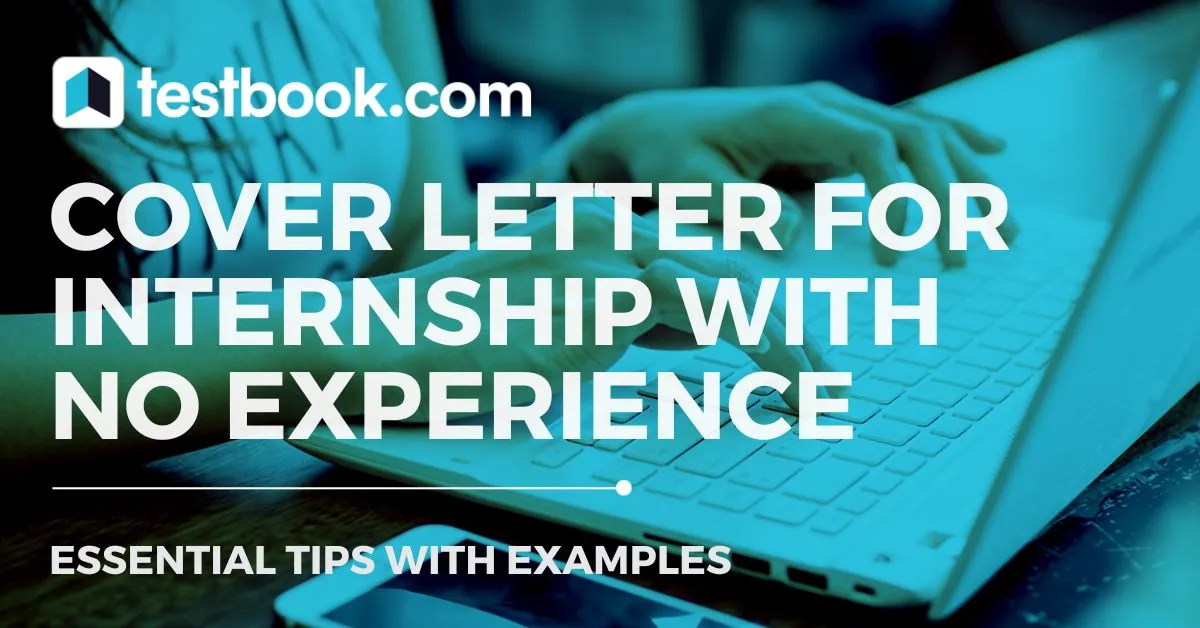
Generic cover letters are easily recognizable and often disregarded. To stand out, thoroughly research the law firm or organization you are applying to. Learn about their areas of practice, values, and recent achievements. This information will help you tailor your cover letter to address their specific needs and demonstrate your genuine interest. Mention specific cases the firm has worked on, or programs they offer that align with your interests. Show that you have taken the time to understand their work. Customize your cover letter to align with the requirements and preferences. Refer to the job description, and identify the key skills and qualifications they are seeking. Use the same keywords and phrases from the job description where appropriate, ensuring that your application is seen as a fit for the role. This also shows you are paying attention to detail and taking the application seriously.
Understanding the Internship
Before you start writing your cover letter, gain a solid understanding of the legal internship position. What are the primary responsibilities and tasks that the intern will undertake? What skills and knowledge are essential for success? Familiarize yourself with the requirements to better align your qualifications and experiences. By researching the internship, you can tailor your cover letter and highlight the most relevant aspects of your background. Make sure to emphasize what makes you the best fit for the position. If there is an option, reach out to current or former interns to learn about their experiences and gain valuable insights. This will allow you to write a cover letter that is both informative and persuasive, and to show a genuine interest in the opportunity.
Analyzing the Job Description
Carefully dissect the job description to understand the employer’s expectations. Look for keywords and phrases that describe the required skills and qualifications. Identify the specific tasks and responsibilities the internship entails. This analysis helps you determine which of your skills and experiences are most relevant and should be highlighted in your cover letter. Use the job description as a guide to structure your letter, ensuring that you address the employer’s needs directly. This strategic approach increases your chances of making a positive impression. Moreover, it demonstrates your ability to follow instructions and pay close attention to detail, which are valuable traits in a legal setting. Your cover letter should reflect a clear understanding of what the employer is looking for.
Identifying Key Skills

Even without prior legal experience, you possess valuable skills that are transferable to a legal internship. Identify your strengths, such as strong research skills, excellent writing abilities, effective communication, problem-solving skills, and attention to detail. Consider any relevant coursework, projects, or extracurricular activities that have helped you hone these skills. For example, if you have participated in a debate team or moot court, highlight your public speaking and persuasive skills. If you have experience in a customer-facing role, emphasize your ability to communicate with clients. The goal is to showcase how your existing skills will enable you to succeed in the internship. Be specific and provide examples to demonstrate your capabilities, showing how your skills align with the requirements of the internship.
Showcasing Your Passion for Law
Express your genuine interest in the legal field. Explain what motivates you to pursue a legal career and what aspects of the law particularly fascinate you. Have you always been interested in justice and fairness? Are you driven by a desire to help others? Articulate your passion in a way that is sincere and engaging. Sharing your motivations adds a personal touch to your cover letter and demonstrates your dedication to the legal profession. Show that you have a clear vision for your career. This helps the employer understand your long-term goals and aspirations. Do not be afraid to show your excitement for the opportunity. Letting your personality shine through will make your application more memorable and impactful.
Emphasizing Your Motivation
In your cover letter, clearly state your motivation for applying for the legal internship. Explain why you are interested in this specific opportunity and what you hope to achieve through the internship. Are you eager to learn from experienced professionals? Do you want to gain practical experience in a particular area of law? Do you want to develop specific skills? Expressing your goals and aspirations conveys your eagerness to learn and contribute. Highlight what you expect to bring to the table, even without experience. Convey your enthusiasm and willingness to work hard. Mentioning your goals, such as wanting to experience a courtroom setting, and why it is interesting, helps demonstrate your seriousness in pursuing a career in law.
Structuring Your Cover Letter for Success
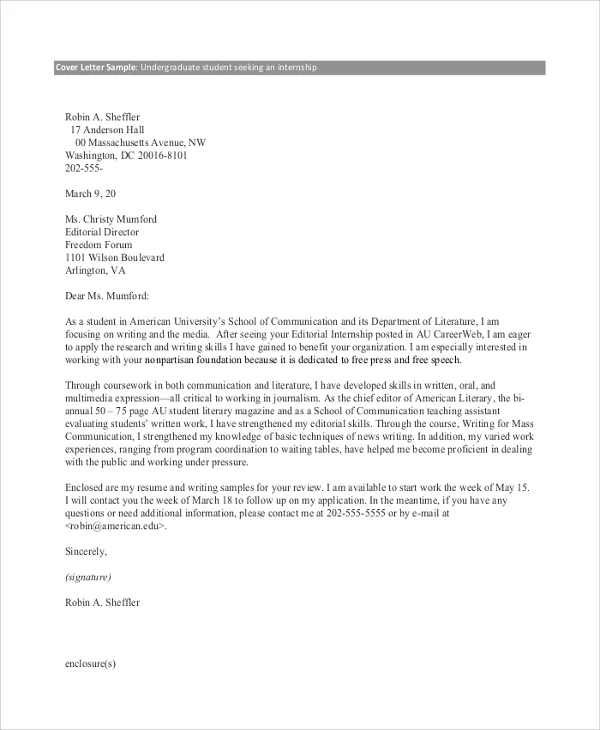
A well-structured cover letter is easy to read and highlights the most important information effectively. Start with a professional header that includes your contact information and the date. Address the letter to the hiring manager or a specific individual whenever possible. Use a clear and concise format with short paragraphs and bullet points to keep the reader engaged. The structure should follow a logical flow, including an introduction, body paragraphs, and a conclusion. Each section should serve a specific purpose, guiding the reader through your qualifications and motivation. A well-organized structure ensures that the key information is easily accessible and makes a positive impression.
Header and Contact Information
Your cover letter should begin with a professional header that includes your full name, address, phone number, and email address. Include the date, and the name and title of the hiring manager, if known. Place this information at the top of the page for easy access. Use a clear and legible font to ensure readability. Make sure your contact information is up-to-date and accurate. Double-check for any errors. Use a professional-sounding email address. It should be easy for the employer to reach you. The header sets the tone for the entire cover letter and makes it easy for the recipient to contact you, highlighting your professionalism.
The Opening Paragraph
The opening paragraph is your first chance to grab the reader’s attention. It should state the purpose of your letter and express your interest in the legal internship. Mention where you saw the job posting and why you are excited about the opportunity. Consider a brief hook that captures the reader’s attention. For instance, if the firm has recently been involved in a notable case, you could mention that and briefly explain why it interests you. Start with a strong, confident statement of your interest and the specific position you are applying for. Make it clear that you are a suitable candidate for the position, and make sure to leave a positive impression.
The Body Paragraphs
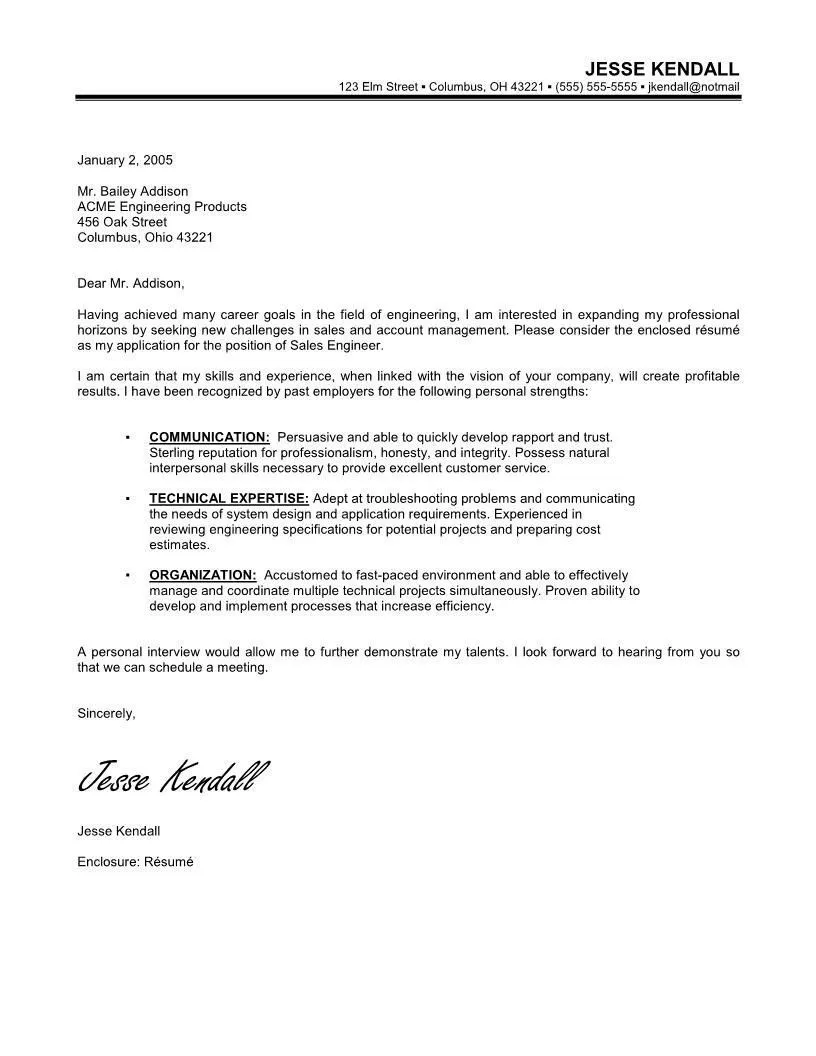
The body paragraphs are the core of your cover letter, where you showcase your qualifications and enthusiasm. Use these paragraphs to elaborate on your relevant skills, experiences, and accomplishments. Provide specific examples to support your claims. Use the STAR method (Situation, Task, Action, Result) to describe your accomplishments, or similar approaches to showcase your abilities. Show how your transferable skills and other experiences have prepared you for the internship. Mention any coursework or projects that relate to the legal field. Highlight your achievements, such as awards, honors, or recognition. Use clear, concise language and avoid jargon. Keep the focus on what you can bring to the internship and what you hope to learn.
Closing Your Letter
End your cover letter with a strong closing paragraph. Reiterate your interest in the legal internship and express your enthusiasm for the opportunity. Thank the reader for their time and consideration. Include a call to action, such as stating your availability for an interview and your willingness to provide additional information. Restate your contact information and offer to follow up. End with a professional closing, such as “Sincerely” or “Yours sincerely,” followed by your name. Your closing should be professional and reflect your eagerness to move forward in the application process. Ensure to proofread this section carefully for any errors.
Formatting and Proofreading
Formatting and proofreading are crucial to create a polished and professional cover letter. Use a clear, easy-to-read font, such as Times New Roman or Arial, in a standard size (e.g., 12 points). Use consistent formatting throughout the document. Use proper spacing, margins, and alignment. Make sure your letter is well-organized, and easy to read. Proofread your cover letter meticulously for any grammar, spelling, or punctuation errors. Have a friend or family member review it as well, since another set of eyes can catch any mistakes. Use a grammar checker to ensure your writing is clear and error-free. Errors can undermine your professionalism and lead to rejection.
Ensuring a Professional Appearance
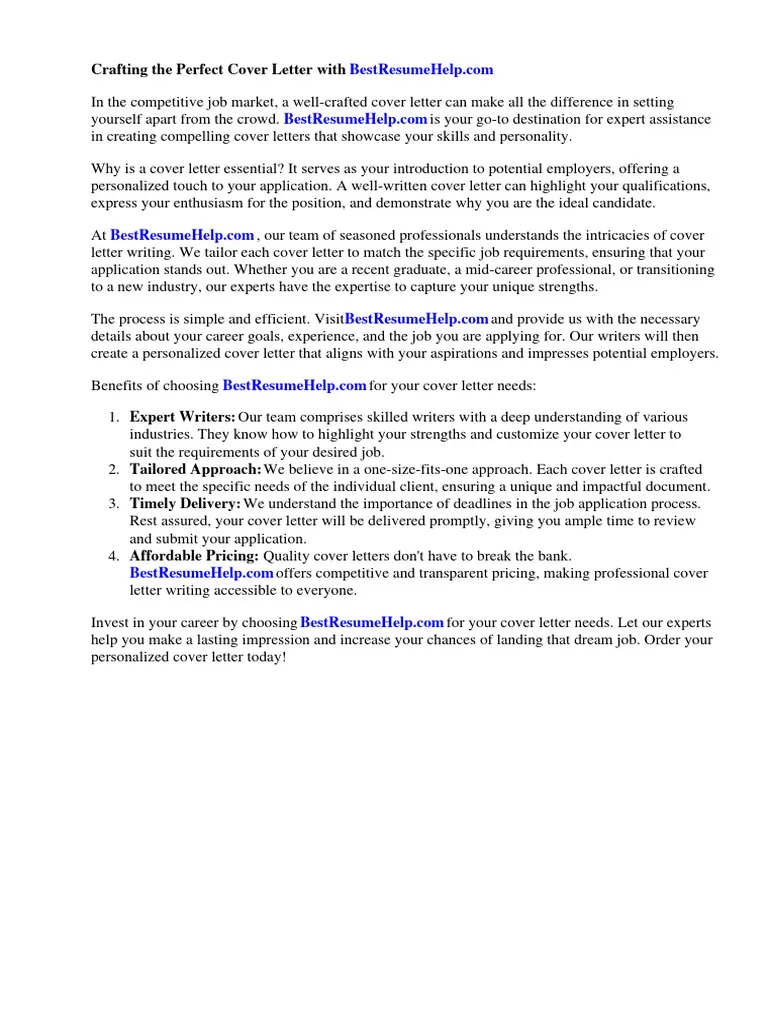
Your cover letter should reflect a high level of professionalism. Use business-style formatting, including appropriate margins and spacing. Ensure that your letter is free of any distracting elements, such as excessive formatting or unusual fonts. If you are submitting your cover letter electronically, save it as a PDF file to maintain its formatting. A PDF will ensure that your document looks the same on every computer. Use a professional email address and avoid using informal language. Ensure that your letter has a clean, professional look. A well-presented cover letter demonstrates your attention to detail and your commitment to presenting yourself in the best possible light.
Proofreading for Errors
Thorough proofreading is essential to ensure your cover letter is free of errors. Proofread your letter multiple times, checking for any typos, grammatical errors, and punctuation mistakes. Read your letter aloud to catch any awkward phrasing or sentences that do not flow smoothly. Have someone else review your cover letter to catch any mistakes you might have missed. Ensure that all names, titles, and dates are accurate. A cover letter riddled with errors can create a negative impression and diminish your chances of getting an interview. Taking the time to proofread demonstrates your attention to detail and your commitment to quality.
Leveraging Your Education
Even if you do not have direct legal experience, your education is a valuable asset. Highlight any relevant coursework, such as courses in law, political science, or related fields. Mention projects, research papers, or presentations that showcase your analytical and research skills. If you have been a part of academic organizations, such as a mock trial team or debate club, be sure to list those, as they reflect your engagement with the legal profession. Emphasize any achievements or awards related to your academic performance. Your education provides a foundation of knowledge and skills that can be directly applied to a legal internship. Show how your educational background has prepared you for the challenges of an internship.
Mentioning Relevant Coursework
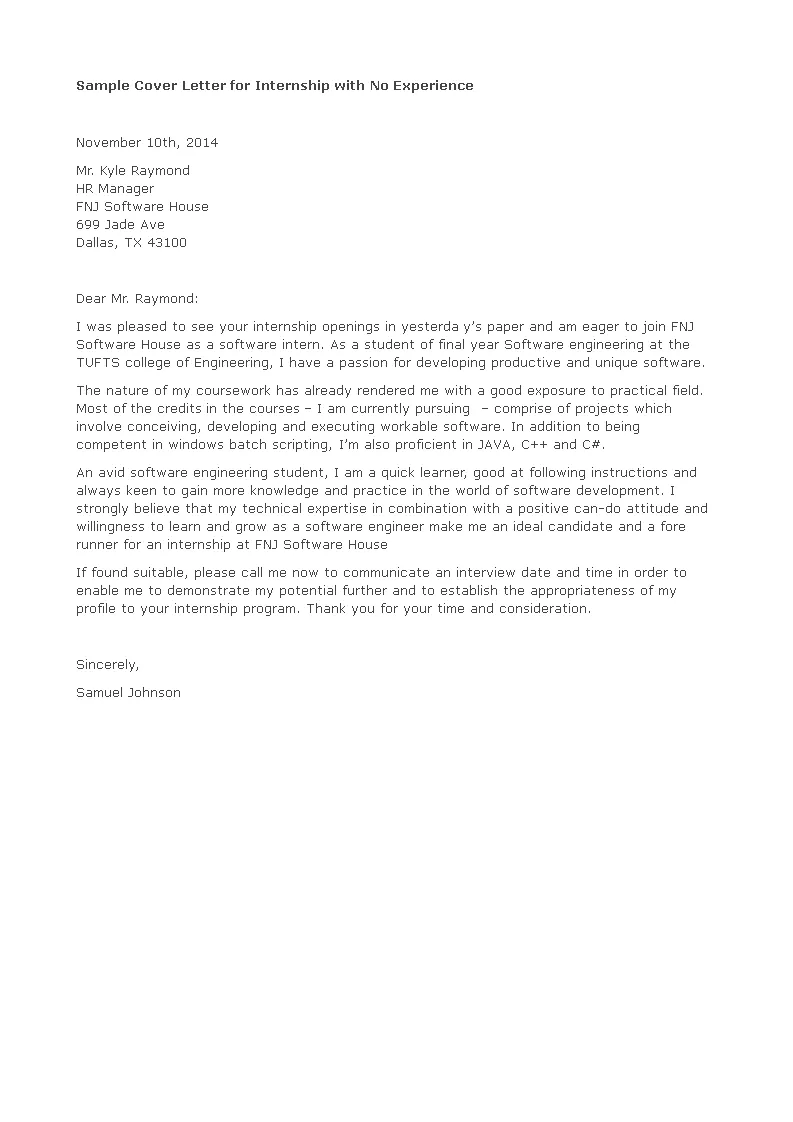
In your cover letter, provide details about any relevant coursework that aligns with the internship requirements. Mention specific courses that have provided you with valuable knowledge and skills, such as legal research, legal writing, or constitutional law. Describe how your coursework has prepared you for the internship tasks and responsibilities. Highlight any projects or assignments that demonstrate your ability to apply legal concepts. For example, if you completed a research paper, describe the methodology, findings, and insights gained. If you participated in a moot court exercise, highlight your skills in legal argumentation and presentation. Demonstrating how your coursework connects to the internship requirements will make your application more compelling.
Highlighting Academic Achievements
Highlight your academic achievements to demonstrate your dedication and ability. Mention any awards, honors, or scholarships you have received. If you have made the Dean’s List or graduated with honors, be sure to include it. Showcase any academic achievements that reflect your ability to excel in the legal field. If you have been recognized for your writing skills, research abilities, or participation in extracurricular activities, include those details. Your academic achievements prove that you are a diligent and capable student with the potential to succeed in a legal internship and beyond. Highlighting your achievements can significantly set your application apart from others.
Demonstrating Research Skills
Legal internships often involve extensive research. Demonstrate your research skills by highlighting any relevant experiences, such as research papers, projects, or internships. Describe the methodologies you used, such as using legal databases, conducting interviews, or reviewing case law. If you have experience using Westlaw, LexisNexis, or other legal research tools, be sure to mention it. Describe any research projects that required you to analyze complex legal issues, synthesize information, and draw logical conclusions. Your research skills are essential for any legal internship, so highlight your ability to gather, analyze, and interpret information effectively. Showing your experience and skills will indicate you can conduct research in an efficient and thorough manner.
Showcasing Analytical Abilities
Legal work demands strong analytical abilities. Show your capacity to analyze legal issues by highlighting your ability to think critically, solve problems, and make sound judgments. Describe experiences that demonstrate your analytical skills, such as case analysis, legal writing assignments, or participation in moot court. If you have experience with case briefing, or other types of legal analysis, be sure to mention it. Emphasize your ability to identify key facts, evaluate legal arguments, and develop logical conclusions. Your analytical skills will be a huge asset. Make sure to highlight this when you apply for legal internships, as it will showcase your potential to handle complex legal tasks.
Writing a Compelling Cover Letter
Your cover letter needs to be a compelling document that grabs the reader’s attention and showcases your unique qualifications. Make sure to start with a strong opening that hooks the reader. Tailor your cover letter to the specific requirements of the job description and demonstrate your passion for law. Write clearly and concisely, using strong verbs and impactful language. Highlight your key skills and accomplishments in a way that is engaging and memorable. Provide specific examples to support your claims, and use the STAR method to describe your achievements. Show a clear understanding of the internship and its requirements. Make sure to make your cover letter stand out from the crowd.
Showcasing Your Communication Skills
Effective communication is crucial in the legal field. Showcase your communication skills by highlighting any experiences where you have communicated effectively, such as presentations, debates, or customer service roles. Emphasize your written communication skills. This is especially important in a cover letter. Highlight your ability to write clearly, concisely, and persuasively. If you have experience in public speaking, be sure to include it. Show your ability to listen actively, understand complex information, and present it in a way that is easy to understand. Great communication skills will set you apart from the other applicants.
Adding a Personal Touch
While it’s important to be professional, adding a personal touch can make your cover letter more engaging and memorable. Express your enthusiasm for the legal field and share your motivations for pursuing a legal internship. Briefly mention your interests, hobbies, or experiences. But keep it relevant and make sure it fits the tone of your cover letter. Share a brief anecdote that illustrates your skills or personality. Showing your personality can make your application more memorable and show you as an individual. By adding a personal touch, you can make your cover letter more engaging and make a lasting impression on the hiring manager.
